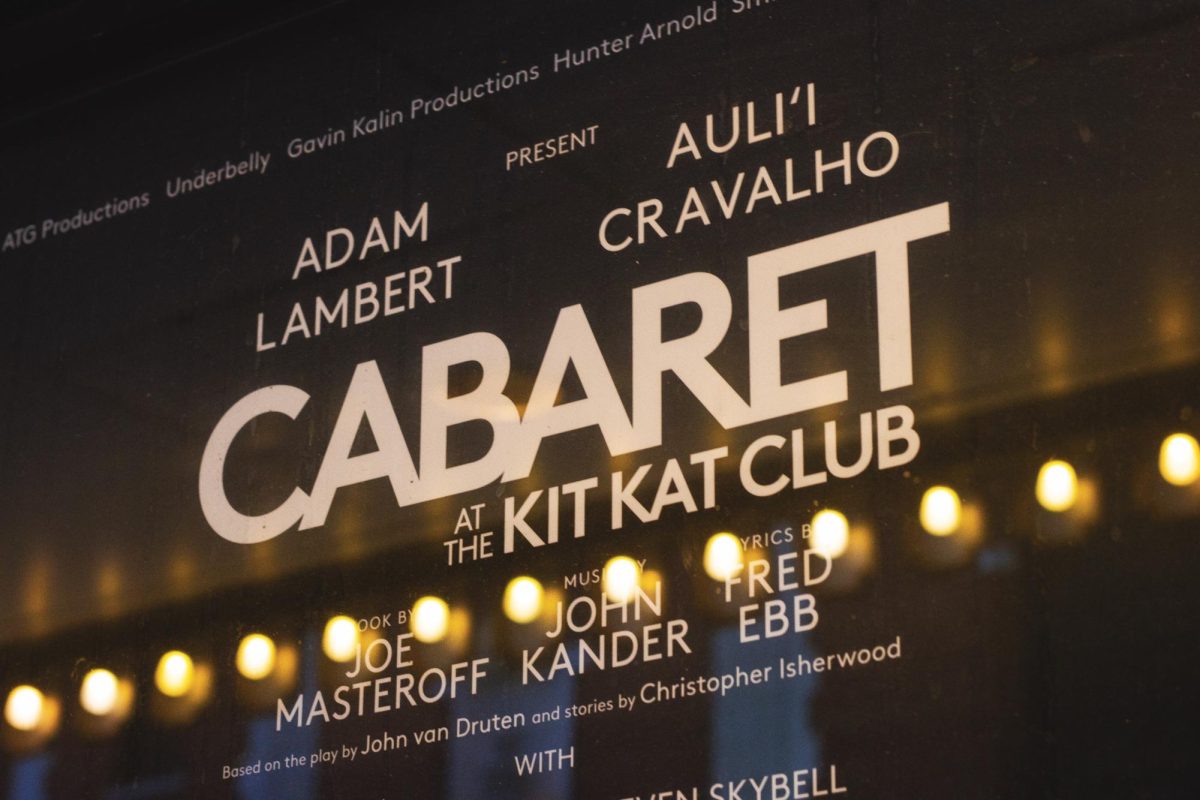Welcome to the Kit Kat Klub of Weimar Republic Germany, where you can drink and dance the night away. Your Emcee (Adam Lambert) greets you with jokes and a smirk. The show’s star, Sally Bowles (Auli’i Cravalho), stumbles in dressed as a baby and pleads with you not to tell her “mama” about her risqué choice of employment.
Lambert and Cravalho began their run in “Cabaret” at the August Wilson Theatre on Sept. 16, 2024.
Lambert’s rendition of the Emcee comedically invited the audience inside the Klub through live interactions as he walked around the 360-degree stage in the center of the theater. For instance, he called out a woman in the second row for being late and demanded her necklace as payment. His charm and impressive German accent rule the show, while his slow character development is a harbinger.
The show presents the freedom and artistic expression of Weimar Berlin as the city slowly yields to extremism.
Cravalho’s performance as Bowles absolutely blew me away. She dropped all pretenses of her acclaimed Disney princess innocence. Her rendition of “Maybe This Time” halts movement on stage and off, leaving everyone rapt as she sings of fear and desperation for love. But outside the sparkling excitement of the Kit Kat Klub and its stars is a politically charged and increasingly dangerous Germany.
The show presents the freedom and artistic expression of Weimar Berlin as the city slowly yields to extremism. Members of the once-ridiculed Nazi Party grow in power; violence against Jewish citizens and political opponents increases. The freedom inside the Klub and ignorance of politics are no longer an option — German citizens must make the choice to conform, flee or make a stand and face harsh consequences.
Another dynamic lead character, Clifford Bradshaw (Calvin Leon Smith), is an American novelist seeking inspiration in Berlin. He meets a suspicious, bag-smuggling German on the train with whom he becomes quick friends. The man, Ernst Ludwig (Henry Gottfried), recommends a boarding house full of colorful characters to Bradshaw and introduces him to the Klub, where he meets Bowles.
While enamored by this new world, Bradshaw soon becomes trapped in a battle between his craft, politics and pleasure. After being kicked out of the Klub, Bowles moves in with Bradshaw, grows close to him, and they decide to raise a baby together. Even though Bowles is unsure who the father is, Bradshaw sees a family as a chance to find his purpose in life.
But childcare requires money — and so does the world.
Bradshaw begins smuggling money for Ludwig, unaware that it funds the rising Nazi Party. Then, the Emcee starts a chilling performance by himself and Kit Kat girls: “Money,” a commentary on greed and power. All plays have lessons, and “Cabaret”’s must be that history repeats itself in ugly ways.
The tumult is elevated by the end of Act One. Fraulein Schneider (Bebe Neuwirth) plans to marry one of her boarders, Herr Schultz (Steven Skybell), a Jewish fruit vendor. Here, the audience learns Ludwig is a Nazi, and Ludwig learns Schultz is Jewish.
The show forces people to ask themselves a serious question that the characters struggle with themselves: When does silence or indifference become complicity?
The audience could feel the heartbreak on stage and a chill in the Klub over the clear repetition of history. No one with social or political awareness could miss the reflection of the present in “Cabaret”’s story of the past.
The casual normalization of extremist ideologies, the targeting of marginalized groups, and the inescapable hatred in every aspect of life exceed the boundaries of 1930s Berlin is playing out in real-time in the United States.
The audience of “Cabaret” was hushed after the lights signaled a reprieve from the silly costumes and hedonistic characters. The air was heavy with people mulling over the books our government wants to ban, the freedom of gender and sexual expression the current administration loves to hate and take away, and the hiring of public figures who possess only self-interest.
The show forces people to ask themselves a serious question that the characters struggle with themselves: When does silence or indifference become complicity? It is a harsh reminder of how the Nazis viewed Jewish people and a realization that the time for naïveté is over. Goodbye glitz and glamor and hello to hatred, misogyny and conformity.
Following the darkening atmosphere, the Emcee loses his playfulness and turns into a blonde, stoic man in a three-piece suit. The dancers abandon their makeup and embrace corporate attire, all become carbon copies of one another spinning in robotic unison. Bowles is rehired by the Klub, gets an abortion and ends things with Bradshaw, who is leaving Berlin.
“Ladies and gentlemen, where are your troubles now? Forgotten?” the Emcee said, taking the audience back to the opening lines.
“Cabaret” is more than an exciting, star-studded revival of a play that originally opened in 1966: it’s a warning. After all, it is easy to dance through life until freedom is merely a memory.


Sharon Bunn • Apr 1, 2025 at 12:40 am
The parallel between Hitler’s methodical takeover of the German Govt, daily bombardment of hate filled propaganda is eerily enfolding daily on the US today. Banning books, dismantling critical govt offices, smearing & trying to eliminate & control the media & free speech should be a wake up call for action,
Well written review.